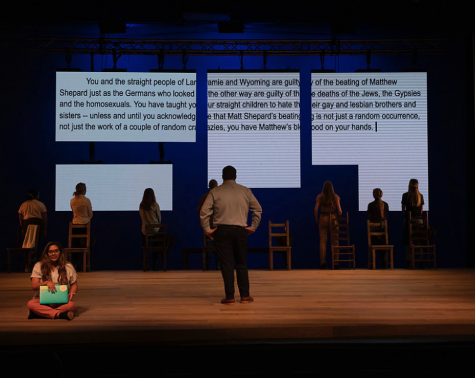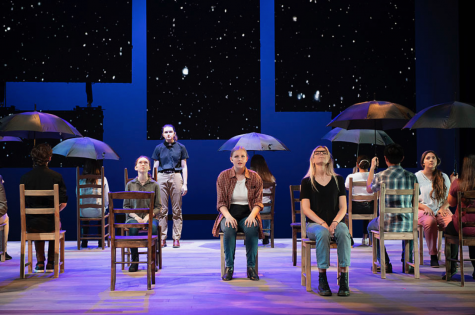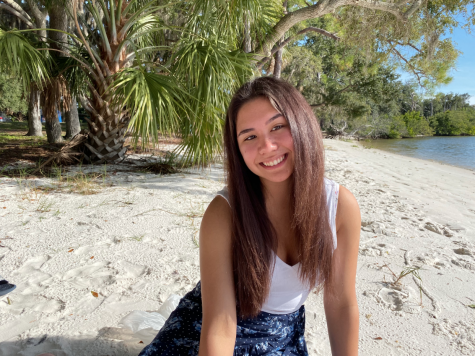Behind the Scenes of The Laramie Project: An Interview with Katie Fletcher
Katie Fletcher gives backstage insight on what it was like to be assistant director for Berkeley’s The Laramie Project
November 7, 2019
Berkeley’s The Laramie Project sheds light on how one single event can affect an entire culture. The play featured verbatim interviews of Laramie residents reacting to the brutal murder of Matthew Shepard. Actors played multiple characters who represented the ideologies and revelations that were brought to the surface after national coverage of their small Wyoming town. The Fanfare sat down with Katie Fletcher to discuss her new position as assistant director, the behind the scenes of the play and the script.
Assistant Director Position:
Q. How did you transition into the assistant director role?
A. Last year, I got to be a student director in class. It was really weird because I didn’t like directing my friends, but I liked the experience of looking at the big picture, rather than looking at it individually. [Mr.] Marshall helped me figure out a way to get more involved in the production side. This is what I really like, rather than being on the stage for this show. I’m trying to transition more into the production side of it, and this is where I ended up. It’s really cool, and I like it a lot.
Q. What is your official role and responsibilities?
A. I’m an assistant director [or the] dramaturgy. I do all the background research on the show. For individual characters, if people don’t know who they are, I’ll find them online somewhere and delve into their background. If there are references to other things in the text, like there’s a line where it says, “We become Waco Jasper. We become defined by this incident.” So, I looked up Waco Jasper, and I have it on a file for everyone in the cast. I would find the lyrics for when the actors sing “Amazing Grace”. Also, I found the research on the actual trial itself. That’s what my job is – pre-show. I was in charge of all of the chair [arrangements] on the stage, so I have a folder with every chair movement that happens on that stage. Also, I do acting notes. I’ll spend about a half an hour with an actor, and I’ll direct them on what they need to do, based on [Mr.] Marshall’s comments. Sometimes, I do water bottle runs or take notes when Annalise is in the booth. It’s cool getting involved in a lot of different behind the scenes stuff.
Q. Is directing something you want to continue in the future?
A. Yeah, I want to be a director. I would want to run my own playhouse. This gets me into the background of how a show comes together. When you’re an actor, you kind of see parts of it, but you don’t really understand the full capacity. I get to learn from Annaliese and the technical work, and I get to watch [Mr.] Marshall [Theater Director] make all these choices. It’s really a learning experience for me.
Q. What plays would you like to direct?
A. I love stuff like this, which involves a social commentary. I think that theaters are a good way to get people to think. You see people on stage and you can feel like you can connect to actual humans. Rather than hearing a song or reading something on a page, you can see people living and present an issue in a very human way. I think it makes it more real for people. I want to keep doing that and keep making people think and question what they think they know. This is why I love the show. It shows how all these different people react to this event and how the community rebuilds itself. It makes it very human, and I love that.

Behind the Scenes:
Q. How do you use different parts of the set throughout the show?
A. The chairs will move throughout the whole show. And so we’ll have moments where you just have what’s called a special or a spotlight on one chair. But then there are other times where the scene is bigger. We have one part when the chairs all line up, and there is a Baptist minister preaching homophobic speech. And then there’s also a scene with a bunch of news reporters, where we’ll have one news reporter on a live feed. We have a camera to film them live and then the other three are going to be videos up here. You’re going to see all their faces going up on the screen, and it’s this media onslaught type of thing.
Q. How do you facilitate the projection process?
A. I’ve been talking to Adrian Vega-Albela, [Berkeley’s video designer who lives in Los Angeles], and I’m the liaison between him and Marshall. I’ll send him emails with notes that we have to change because of how the videos are formatted. Mackenzie is the one who actually runs the software. She’s the one who organized it all. Our stage manager, Annaliese [Donaldson-Pham ’21] deals with calling all of the projection cues. She’s in charge of every single touch, happening during the show. It’s pretty crazy.
Q. What is the casting and audition process?
A. Everyone goes into general auditions. I’ll sit in there, Annaliese takes notes, and Marshall and Miss [Bryn] Harvey [Lower Division Theatre Specialist and Music and Theater Strand Coordinator] are the ones doing the actual like casting. For this show, we needed a lot of people who could play multiple genders because there are too many parts of different genders to split it down the middle. We looked for physicality: whether we think they’d be able to like to sit deeper into a male stance. Marshall knows everyone from class and knows what kind of roles that they can do. Big character roles like Doc O’Connor are cast pretty early because you need a specific type of person to play those roles. For this show, at least the first round cast a lot of the company. Then we had a round of callbacks, which was basically for people that Marshall needed to see a little bit more from. Maybe he hasn’t seen as much of their works or doesn’t know exactly where they fit. We had about eight people in callbacks, and everyone was able to gest cast. We were lucky enough that we didn’t have to cut any callback people, which was really cool. And then they just got assigned all the different roles from there. Marshall spent about two days making sure that no one was overloaded. But yeah, it was all a general casting process in the beginning.
https://www.youtube.com/watch?v=-PRmDXcendM&feature=youtu.be
https://www.youtube.com/watch?v=cefJNmFMAH0
BACKSTAGE TOUR: Katie Fletcher gives a tour of the stage, projection area and dressing rooms. Video by Catherine Amburgey.
The Script:
Q. What are the benefits of verbatim theatre?
A. Verbatim theatre is a genre of theater, and [The Laramie Project] is a really good example of that. It’s also called a documentary drama. It’s really cool because you can clearly see who these people are because [the script] has words that people actually said. It does a lot of favors for the actor. You have the quirks and the little stutters of speech, which tells you a lot about character. You can infer a lot from verbatim theatre scripts because that’s literally words that came out of someone’s mouth, without a playwright having to think about how a person would talk. It’s just reality, which is so cool, and it allows for such a variety of people. People are very different and verbatim theatre makes it easier to understand them.
Q. How do the actors balance staying true to their character but also making it unique?
A. One thing that we didn’t want to do is just imitate [the real people of Laramie]. We wanted to read it like real people, but we didn’t want to just copy the real people. It wouldn’t do justice to the art of theater. This is Berkeley’s version of The Laramie Project. We’re not trying to imitate people, so we didn’t want to give people those resources of the actual people because we wanted them to create their own characters. [The actors only use the script to build their character, but they are able to use Katie’s research and dialect training to be more accurate.]
Q. What are the difficulties and benefits of having actors play multiple characters?
A. It’s really fun because you get to see a lot of different people. There are moments in the show where midline someone will switch characters. That’s really fun. It does a lot to teach about the physicality and vocalization of character. If you’re just playing one character, you can kind of be yourself to some extent. Obviously you’re acting but by [playing multiple roles] it forces you to change your physicality or change the way you speak. You have to talk in high or low pitches and make shifts that you wouldn’t normally have to do in a regular play. That’s hard, obviously. And that’s the difficulty but it is so fun, and it teaches the actors a lot that they can carry on into other shows in the future.



